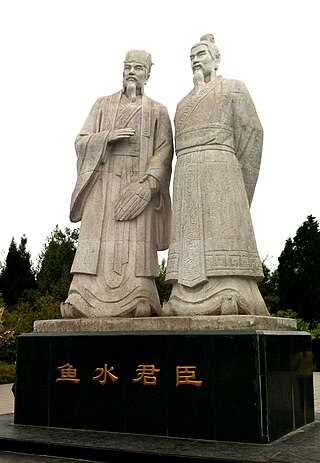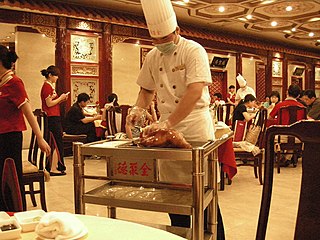
Beijing cuisine, also known as Jing cuisine, Mandarin cuisine and Peking cuisine and formerly as Beiping cuisine, is the local cuisine of Beijing, the national capital of China.

Peking duck is a dish from Beijing that has been prepared since the Imperial era. The meat is characterized by its thin, crispy skin, with authentic versions of the dish serving mostly the skin and little meat, sliced in front of the diners by the cook. Ducks bred especially for the dish are slaughtered after 65 days and seasoned before being roasted in a closed or hung oven. The meat is often eaten with spring onion, cucumber and sweet bean sauce with pancakes rolled around the fillings. Sometimes pickled radish is also inside. Crispy aromatic duck is a similar dish to Peking duck and is popular in the United Kingdom.

Yan Song, courtesy name Weizhong (惟中), pseudonym Jiexi (介溪), was a Chinese politician and regent of the Ming dynasty. He was notorious for being corrupt and for dominating the Ming government for two decades as Grand Secretary during the reign of the Jiajing Emperor.
Errenzhuan is a genre of musical theater and folk dance from Northeast China, usually involving two performers. The dance uses folding fans or square-shaped red handkerchiefs, which are twirled as the songs are performed. It is popular due to its comedic dialogue and sketches, which have obfuscated the old dances and songs.

The grand chancellor, also translated as counselor-in-chief, chancellor, chief councillor, chief minister, imperial chancellor, lieutenant chancellor and prime minister, was the highest-ranking executive official in the imperial Chinese government. The term was known by many different names throughout Chinese history, and the exact extent of the powers associated with the position fluctuated greatly, even during a particular dynasty.

In cooking and gastronomy, duck or duckling is the meat of several species of bird in the family Anatidae, found in both fresh and salt water. Duck is eaten in many cuisines around the world. It is a high-fat, high-protein meat rich in iron. Duckling nominally comes from a juvenile animal, but may be simply a menu name.

Quanjude is a Chinese restaurant chain known for its Peking roast duck and its longstanding culinary heritage since its establishment in 1864 in Beijing, China.

Siu mei is the generic Cantonese name of meats roasted on spits over an open fire or a large wood-burning rotisserie oven. It creates a unique, deep barbecue flavor and the roast is usually coated with a flavorful sauce before roasting. Siu mei is very popular in Hong Kong and Macau, and overseas Chinatowns especially with Cantonese emigrants. In Hong Kong, the average person eats siu mei once every four days, with char siu being the most popular, followed by siu yuk in second, and roast goose being third. Some siu mei such as white cut chicken and soy sauce chicken are not roasted at all but they are still considered siu mei nonetheless. siu mei is also known colloquially as siu laap, as the latter term encompasses siu mei and laap mei, a type of preserved meat. They are usually prepared in the same kitchen during autumn and winter season in what are often known as siu laap establishments or Chinese BBQ shops. Siu laap is also often sold alongside lou mei, such as orange cuttlefish and Pig's ear.

Chinese imperial cuisine is derived from a variety of cooking styles of the regions in China, mainly from the cuisines of Shandong and Jiangsu provinces. The style originated from various Emperors' Kitchen and the Empress Dowagers' Kitchen, and it is similar to Beijing cuisine which it heavily influenced.
The city of Beijing has a long and rich history that dates back over 3,000 years.

Fairmont Beijing is a hotel in the Beijing central business district of China and is part of the Fairmont Hotels and Resorts brand.

China Time-honored Brand is a title granted by the Ministry of Commerce of the People's Republic of China to Chinese enterprises that existed before 1956, sell products, techniques or services passed down through generations, have distinct Chinese cultural characteristics and are widely recognized by society.
Prince or King of Yan was a Chinese feudal title referring to the ancient Chinese State of Yan and to its fiefs including the capital Yanjing.

"Beijing" is from pinyin Běijīng, which is romanized from 北京, the Chinese name for this city. The pinyin system of transliteration was approved by the Chinese government in 1958, but little used until 1979. It was gradually adopted by various news organizations, governments, and international agencies over the next decade.
Zhao Wenhua was a Chinese public official during the reign of the Ming dynasty's Jiajing Emperor.

Da Dong Roast Duck Restaurant is a Chinese restaurant located in Dongcheng District, Beijing. The restaurant is named after its founder Dong Zhenxiang (董振祥), who bears the nickname "Da Dong" (大董).
Zhang Jing, going by the name Cai Jing (蔡經) for much of his life, was a Chinese official who served the Ming dynasty. As he climbed the ladder of Chinese bureaucracy, he became in charge of several provinces as supreme commander, and was involved in conflicts such as the suppression of the Yao rebellions in the southwestern frontier and the defence of China from wokou pirates. At the height of his power, he was in charge of the military in six provinces, an unprecedented number in the Ming dynasty. Despite winning a great victory against the pirates in 1555, he quickly fell from power by running afoul of the domineering clique of Yan Song and Zhao Wenhua, and was executed by the Jiajing Emperor later in the same year.

Xu Jie courtesy name Zisheng (子昇), was a Chinese politician of the Ming dynasty.

Yang Jisheng was a Chinese court official of the Ming dynasty who held multiple posts during the reign of the Jiajing Emperor. He is remembered as a political opponent of Yan Song, on whose initiative he was arrested and eventually executed. His death, widely perceived as unjust, was followed by significant posthumous veneration of his memory during the late imperial era.

















